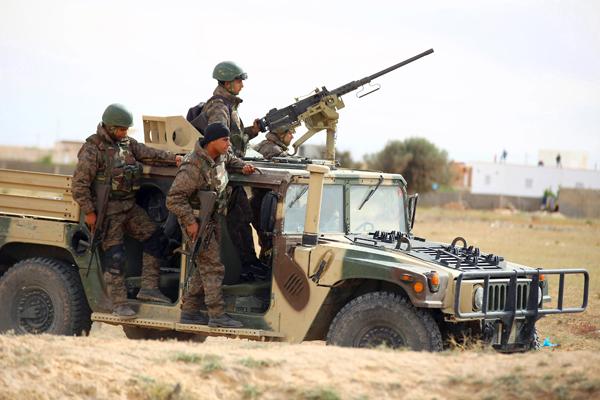You are here
Shutting up shop: Libyan conflict squeezes southern Tunisia
By Reuters - Jun 10,2019 - Last updated at Jun 10,2019

A vendor displays clothing for sale at ‘Souk Libya’ marketplace in the town of Ben Guerdane, near the Libyan border in Tunisia, on May 24 (Reuters photo)
BEN GUERDANE, Tunisia — Standing in his one-room store between tables stacked with brightly coloured t-shirts and jeans, Fathi Mars gestures in despair.
"If the war continues we will shut down," said the shopkeeper.
It is a common refrain in Ben Guerdane. The town in Tunisia's impoverished south has for decades served as an entrepot for goods, smuggled or imported, 35km across the border from Libya.
Since the toppling of Muammar Qadhafi in 2011, however, conflict in the neighbouring country has decimated business.
Around 700 stores have closed in the past eight years as supplies dwindled and prices soared, according to a local traders' association. The stalls' skeletal remains pockmark the town's streets — rusting and buckled metal frames once heaving with goods for sale.
The financial fallout from Libya's war is another blow for Tunisia. The north African country helped inspire the broader Arab Spring uprisings with its overthrow of Zine Al Abidine Ben Ali in 2011. But while Tunisians now have democracy, financially they are struggling.
The Tunisian economy shrank 13 per cent between 2017 and 2011, according to World Bank data, and youth unemployment, which helped drive the revolution, is still among the highest in the region at around 35 per cent.
Austerity measures, high inflation and the impact on tourism and foreign investment from periodic attacks by Islamist militants have taken a heavy toll, prompting protests in April in the central town of Sidi Bouzid, where the 2011 revolution started.
Libya used to act as a pressure valve for the Tunisian economy, a place where thousands of Tunisians went for work each year and a source of cheap goods they could sell back home. But the violence has damaged the flow of products and people.
Local grievances
Ben Guerdane's so-called “Souk Libya” — a labyrinth of low-slung stores selling clothes, televisions and microwaves, some still in boxes with the names of Libyan import firms — has been under pressure for years. Its problems deepened after Khalifa Haftar, the commander of Eastern Libya forces, began an offensive in early April to take Tripoli from soldiers loyal to the internationally-recognised government.
The fighting nixed a trade deal between Tunisia and Libya which would have allowed travellers to import consumer goods worth 10,000 Libyan dinars ($7,140) to Tunisia, reversing the limits and arbitrary bans previously put on imports by armed groups and officials representing the Libyan state, traders and officials in Ben Guerdane said.
As officials were working out the details of the agreement, the Tripoli war broke out, putting talks on hold as western Libyan communities controlling the trade routes focused instead on fighting.
"The people of Ben Guerdane depend on what is happening on the other side of the border," said Fathi Abab, head of the city council, who was involved in the trade negotiations. "We agreed on a new deal but war broke out. It has not been implemented."
Lacking the economic development of Tunisia's northern tourist regions, the south of the country is a popular recruiting ground for Islamist militants. In 2016, they tried to seize Ben Guerdane with the help of homegrown extremists but were thwarted by Tunisian security forces.
Most adults in the ramshackle town of 100,000 don't have a regular job, according to a local labour union and without income from trading, tensions rise. When Libya closed the main Ras Jdir crossing into the country for more than two months last year, Ben Guerdane residents demonstrated.
"If border economies further deteriorate without the creation of alternative livelihoods, further protests in border regions are certain, as we have seen repeatedly in the past few years," said Max Gallien, a political scientist who has researched cross-border trade and smuggling in north Africa.
"They are drawing on a rich and serious legacy of local grievances. It's important to take them seriously."
Out of mode
Regionally, the renewed conflict in Libya threatens to disrupt oil supplies, drive increased migration across the Mediterranean to Europe, and scupper UN plans for an election to end rivalries between Libya's parallel administrations.
Tunisia is not the only country hurting economically. Egypt used to send workers to Libya while its southern neighbours Chad and Niger have also benefitted in the past from trade and smuggling, according to Libyan businessmen.
Traditionally, Tunisian traders have been able to exploit a lucrative gap between high prices at home, where the government has been increasing taxes, and low prices in Libya, where little or no import duties or taxes are paid on goods, and food and fuel have been heavily subsidised.
But imports of goods into Tunisia have been in decline for more than three years as rival groups in Libya jostle for supremacy. Armed groups controlling the border and trade routes have imposed their own duties or banned supplies.
The Libyan dinar, under pressure from the conflict, nosedived in 2017 compared to the black market, driving up prices and prompting the central bank to devalue the exchange rate for commercial and private transactions the following year.
Traders in Ben Guerdane said the cost of importing items such as Turkish carpets and trousers made in China from Libya had doubled in the past three years
Tighter Tunisian border controls, designed to keep militants out, have also hit petrol smuggling networks, as has a campaign by Libya's state oil firm, NOC, to halt the illicit fuel trade. In addition, the Tripoli government last year stopped subsidising food which made the smuggle of wheat and pasta less profitable.
Imports from Libya to Tunisia by land fell to 3,500 tonnes in April this year from 4,188 tonnes in April 2010, according to Tunisian customs data. These figures do not include the large volume of goods that are smuggled across the border.
Another measure of the drop in trade is the near halving of the number of people travelling across the border to 101,978 in April 2019 from April 2010, according to Tunisian statistics. Traders from Tunisia often go on day trips to Libya to do business.
In Ben Guerdane, Mars, the clothing retailer, has tried to replace Libyan goods with wares imported from Turkey, China and other East Asian countries but they are more expensive and don't fit the “Souk Libya” model.
He last got supplies from Libya two years ago, pointing to some jeans on a table.
"You can't sell them as they are out of mode," he said.
Related Articles
BEN GUERDANE, Tunisia — After years of war in Libya, Tunisian traders celebrated the reopening of the border with their oil-rich North Afric
TUNIS/ALGIERS — The signal to attack came from the mosque, sending dozens of militants storming through the Tunisian town of Ben
TUNIS — Tunisian troops have killed 10 militants around Ben Guerdan on the Libyan border after a Daesh attack on Monday that killed at least

















